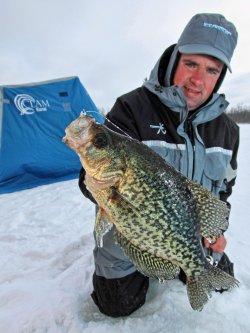Pan Fish

Image From the Organ Department of Fish & Wildlife
Most people who go fishing start off in a pond trying to catch sunnies or some other kind of pan fish. It is the most common kind of fish to catch for someones first catch, and there is a reason for that. They are plentiful, bite easy, and put up a decent fight for their size if your using light tackle. While it is often regarded as a beginner fish, pan fish are some of the most fun to catch. There are many different types of pan fish but the two most commonly targeted are the white and black crappie. There is also the blue gill, the red eared sunfish, perch, pumpkin seed, and rock bass. All are pretty easy to Identify if you know what t look for. While trout fishing is my favorite, every now and then, it is nice to switch it up and chase some gills.
The bluegill, pumpkin seed, and sunfish, affectionately called sunnies, mostly live in ponds, lakes, and slow back waters of rivers or streams. Most eat bugs, worms, or very small fish, like fat head or shiner minnows. They can be caught on almost anything, but my favorite way to target them is with a fly rod. There is something that is just enjoyable about going out on a hot summer day, in the middle of the afternoon, and watching a bluegill slurp your deer hair popper off the surface of the water. When deciding to target pan fish, it is best to start near the banks or near cover. They are often found under or near lilly pads, weed beds, or fallen trees or branches hanging over the water.
Fishing for pan fish with a fly rod is pretty enjoyable and if using a 3 wt, or lighter, they can put up a real fight. I personally like to use a deer hair popper, or foam popper, but sometimes I’ll switch to an ant pattern or some other form of terrestrial, like a grasshopper.
Fly fishing for pan fish also serves a dual purpose if perhaps, trout is your main target. Casting for pan fish helps dial in your skills as a fly fisherman without being too harsh like a native trout would be. While I would not recommend casting over them, you are much more likely to get away with doing it and not scaring them then if you were to do it to a trout. Your presentation doesn’t have to be as delicate or the cast as refined and this serves as an excellent way to really dial in your technique.
If you don’t feel like dealing with a fly rod, don’t know how to use one, or want to take someone fishing who has never gone before, there is nothing wrong with taking a spinning rod out. You are likely to catch more fish on a spinning rod than a fly rod and are able to better target different species of fish. It is more effective to chase crappie with a spinning rod as it allows a greater variety of baits to be thrown. Crappie are some of the more aggressive pan fish out there and a live minnow suspended beneath a bobber or, “float” if we are trying to sound professional, will work wonders. There are Multiple Ways to rig and fish for crappie, but the most effective, in my opinion, is the live minnow.

Huge Black Crappie caught through the ice
One little known fact about pan fish is that most of them are actually pretty tasty. The black and white crappies are actually highly regarded for their white, flakey meat and non fishy taste. If you plan on keeping and eating a few, invite a some friends over and have a good old fashioned fish fry. When catching pan fish, the creel limit, or how many fish each angler can keep in a day, is 50, so if you and a friend go out, you have the ability to keep 100 fish. Normally I would say this is unsustainable and should be avoided, but pan fish are prolific spawners and repopulate very quickly. If left unchecked, they often over run small ponds and crowd out the larger game fish, such as large mouth bass. Pennsylvania Fish and Boat Commission agree with this sentiment.
Overall, I feel like pan fish are under appreciated. While they don’t have the looks of a native Brooke Trout or the fight of a Musky, they are still really fun to catch, and honestly, I owe it to them for kickstarting my passion for fishing.